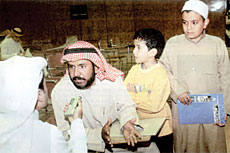JEDDAH, 18 December 2004 — Unemployed Saudi youth braved cold weather, rain and rough terrain in remote areas and rushed to register their names at special centers set up all over the Kingdom for job seekers.
The process started two days ago and will last for sometime in a move that could serve as an indication of the qualifications of the applicants and the types of jobs they seek.
From Jeddah along the Red Sea to Al-Ahsa in eastern Saudi Arabia and from Hail in the far north to the mountainous areas of Jizan, large numbers of job seekers continue to throng the registration centers. Some from the Farasan Island in the south spent hours on ferries battling the rough winter waters to reach registration centers on the mainland.
The move was launched by the Ministry of Labor in coordination with the General Corporation for Technical Education and Vocational Training as part of a wider Saudization drive that seeks to replace foreign workers with Saudis.
“The listing of job seekers will enable the ministry to know the number of Saudi youth looking for work and their qualifications. Following the listing down these youth will undergo special training in certain areas before being referred to local labor offices in major cities to find work with the private sector,” said Dr. Ali Al-Ghefais, the corporation’s governor and coordinator of the employment campaign. He said many of the applicants are not qualified to take up jobs with the private sector and need to undergo some training to prepare them for work. Extensive training courses could last for ten days after which the applicants would be directed by the labor offices now that the private sector has defined the job specifications they need.
In addition to maintaining economic growth rates that are at least sufficient to keep pace with the rise in population, the Kingdom faces the challenge of finding jobs for the thousands of citizens who enter the job market every year without disturbing the prevailing structure of the market which remains heavily dependent on foreign workers.
Official figures put the unemployment rate among Saudis at 8.2 percent, but analysts said the percentage is much higher among younger people. The inability of a youthful Saudi work force to displace foreign workers is one of the great challenges facing the authorities, and for years has been the focus of the country’s Saudization program, whose particular focus is on youth.
A father in Riyadh brought his two sons, one of them a graduate with a college degree in petroleum engineering who has been without a job for five years, to the application center saying he wanted to have them register in the hope that they would find jobs somewhere.
In some areas police have to be called in to control the crowds causing confusion among the local committees handling the registration process. Paramedics were also put on alert as a precautionary measure against any eventuality resulting from the crowds. The applicants will undergo personal interviews to determine their preferences and the type of jobs they would like to pursue.
Under guidelines set by the Shoura Council by 2007 at least 70 percent of the work force have to be Saudi, with Saudization accelerated in some industry sectors. The demographic realities place intense pressure on Saudi authorities to create at least 160,000 jobs annually. Many blame the education system for failing to prepare the country’s youth for jobs requiring technical expertise. The problem is further compounded by the fact that many graduates refuse to take what are commonly considered menial assignments, further enlarging the ranks of approximately six million expatriate workers.
The authorities have earlier issued a law requiring private businesses employing more than 20 people to increase the number of Saudi nationals by five percent of the work force every year. The current required rate of Saudi employees is 30 percent. The target set in the current Five-Year Development Plan (2000-2005) calls for providing 817,000 jobs for Saudis by creating new opportunities or by replacing expatriates with Saudi citizens.
Analysts say the private sector will be the main beneficiary since the bulk of any Saudization effects will be reflected in the form of increased purchases of goods and services for local business.


